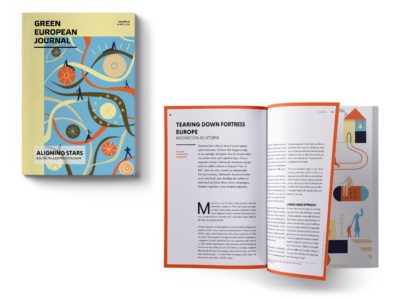Turkey’s aspirations for EU accession, often cast as the want for market and visa liberalisation, also uphold an ongoing determination for equality and justice.
Ever since I learned of its values, I have believed in Europe. Most Turkish citizens also believed in it – at least for a time. Polls from the early 2000s showed Turkish levels of support for the European Union at around 75 per cent. True, we might have believed in Europe for different reasons, me and the majority of Turkish citizens, but we jointly believed in its potential for our lives.
As a twenty-something who watched Turkey gain candidate status at the Helsinki Summit in 1999 and the December 2004 declaration that Turkey was ready for full membership negotiations, I was excited about Europe. I believed Europe embodied my values. Membership of its Union would set them in stone in Turkey, too. Europe equalled a willingness to expose one’s national identity and history to a radical critique, a readiness to confront any crime that emerged. Europe equalled openness about sexuality, acknowledgement of the freedoms and rights for those who don’t conform to cis heterosexual norms. Europe equalled democratic acceptance of all forms of politics. Radical Marxists, Kurdish nationalists, eco-warriors, and Islamists all had the right to political representation: Europe was there to ensure that.
When Europe demanded these values from Turkey during membership negotiations over the 2000s, I said those were my values, too. In urging them, I maintained that Europe and its values constituted Turkey’s future.
Two decades on from the mid-2000s, and I still believe in Europe and those values. Whether Europe remains Turkey’s future is a different question, however. According to polls from the early 2010s, levels of support for Europe fell to 58 per cent. In 2017 the figure dropped further to 48 per cent; over half of the country said “no” to Europe. Then, when the Turkish economy collapsed, support began to climb again – nowadays, it’s at around 50 per cent.
How can my belief in Europe remain unfazed when that of other Turkish citizens has fluctuated dramatically? Europe continues to be Turkey’s leading trade partner, and I suspect the previous support expressed a desire for market integration rather than embracing Europe’s ethical and political values: it was a thirst for more market and visa liberalisation. Turkish people wanted the free movement of people and goods. But Europe’s leaders wanted only the latter: the idea of Turks swarming into their lands terrified them. What people like me demanded and desired, on the other hand, was the free movement of values. Like in Spain, we wanted to examine the military regime that ruled the country only decades previously. Just like in Germany, we wanted the freedom to interrogate the genocidal chapters of our past. Like in France, we wanted more vital workers’ unions and rights and protections for activists.
This shared European vision of the free movement of values remains sadly unrealised. And, in the meantime, while trade has never been freer, Turkey’s increasingly impoverished citizens are refused even short-term visas to Europe. Recently, Turkey’s role as a guardian of refugee movements has solidified instead.
The Europe of my twenties has changed beyond recognition. Policies of leading European governments resemble Recep Tayyip Erdoğan’s autocratic regime more closely with every passing day. From Italy to Hungary, nasty, cynical politics that despises the likes of us – the so-called “rootless cosmopolitans and degenerates” – is rising. But I retain hope. Progressive thinkers and activists in Europe continue to push forward values integral to that shared European vision from two decades ago. The tunnel that separates us has never seemed so long. Yet some light continues to shine at its end, even as Turkey faces suspension from the Council of Europe thanks to the recklessness of its strongman.

